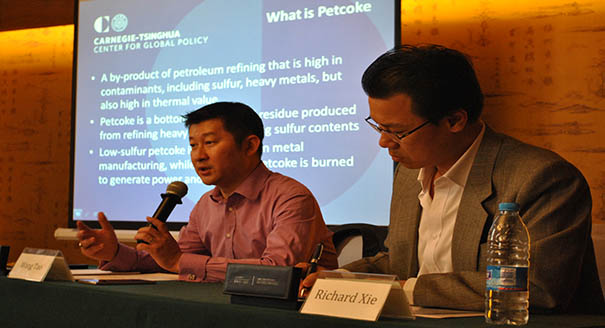Petroleum coke (petcoke), a by-product of petroleum refining that is high in contaminants, has quietly emerged in China as an inexpensive but environmentally harmful alternative to coal. Although the Chinese government is committed to reducing coal consumption for the sake of air quality, knowledge about the negative environmental impact of petcoke is not yet widespread. If the country’s efforts to reduce air pollution are to be effective, petcoke’s contribution to carbon emissions must be addressed.
Carnegie–Tsinghua’s Wang Tao presented his findings on how China can mitigate the effects of petcoke pollution. Then Richard Xie moderated a discussion with Mao Xianqiang and Conway Irwin exploring the implications of, and policy responses to, China’s growing use of petcoke in terms of the country’s ongoing commitment to reducing carbon emissions.
Discussion Highlights
- A Growing Problem: Petcoke is a substance that is burned to generate power and manufacture aluminum. It produces up to 11 percent more carbon emissions than coal. According to participants, global petcoke use has increased substantially since the mid-2000s, when rising coal prices prompted firms to turn to petcoke and other inexpensive alternative energy sources. Panelists agreed that if China wishes to hit its targets for reducing carbon emissions, policymakers must act quickly to mitigate the environmental impact of the country’s petcoke use.
- A Transnational Environmental Issue: In 2013, the U.S. government reclassified petcoke as waste and stopped issuing licenses for burning the substance domestically. Panelists pointed out that U.S. refineries consequently began exporting their surplus petcoke overseas; between 2008 and 2013, U.S. petcoke exports to China increased twentyfold to over 7 million metric tons per year. If China begins regulating petcoke more strictly, the country’s petcoke supply may simply be exported to the Middle East and Southeast Asia instead, participants noted. They agreed that petcoke use is a global environmental challenge that calls for multilateral efforts, such as an international agreement that classifies the substance as waste and places conditions on its use.
- Technology to Minimize Emissions: Some factories have installed emissions treatment systems or specialized boilers for burning petcoke that can absorb up to 95 percent of its pollutants. Many factories that use petcoke, however, are not equipped with such technology, because many of them are small- or medium-scale firms that may not be able to afford to install such expensive equipment without state financial assistance. Panelists concluded that these technologies will continue to play a vital—albeit limited—role, by ensuring that existing petcoke supplies are burned in a way that minimizes their carbon and sulfur emissions. They agreed that further research is needed to develop more efficient, affordable technologies to manage petcoke’s environmental impact.
- Measuring Petcoke’s Impact: Although the Chinese government has already taken steps to reduce carbon emissions and other air pollutants, corporate and state actors have limited knowledge about petcoke and how to measure the pollutants it produces. Not even the UN Convention on Climate Change has comprehensive standards for measuring petcoke emissions, and a large proportion of global petcoke emissions are not properly accounted for. Moreover, there are different kinds of petcoke that may produce vastly different amounts of carbon and sulfur emissions, depending on their chemical composition and how they are burned. Panelists emphasized that further scientific inquiry of petcoke’s complex environmental impact is needed.
- Enhancing and Complementing Enforcement: Panelists agreed that new emissions and accounting rules will only be effective at mitigating China’s air pollution problem insofar as they are enforced. Robust monitoring remains difficult, however, because most information about petcoke use is proprietary, and the companies involved often are unwilling to reveal their sourcing policies and burning procedures to government regulators, participants observed. They concluded that state efforts to create incentives for petcoke users to cooperate will have a higher likelihood of success if they are combined with other policies—such as emissions caps and import tariffs—that internalize the environmental costs of air pollution for commercial actors.
Wang Tao
Wang Tao is an expert on climate and energy issues and runs a program at the Carnegie–Tsinghua Center for Global Policy that examines China’s climate and energy policies, with particular attention to transportation and international climate negotiations.
Richard Xie
Richard Xie is the associate director of external affairs for the Paulson Institute’s China office. He previously worked for the Economist Group and for Dow Jones International.
Mao Xianqiang
Mao Xianqiang is a professor of environmental studies at Beijing Normal University. His research centers on how China manages its environmental policy and related economic policies.
Conway Irwin
Conway Irwin is as an environmental affairs specialist at the U.S. Embassy in Beijing. She previously worked as an energy markets analyst for the U.S. Department of the Treasury.
